冀教版英语七年级下册《Lesson 11 Food in China》课后作业试题
- 格式:doc
- 大小:44.00 KB
- 文档页数:7
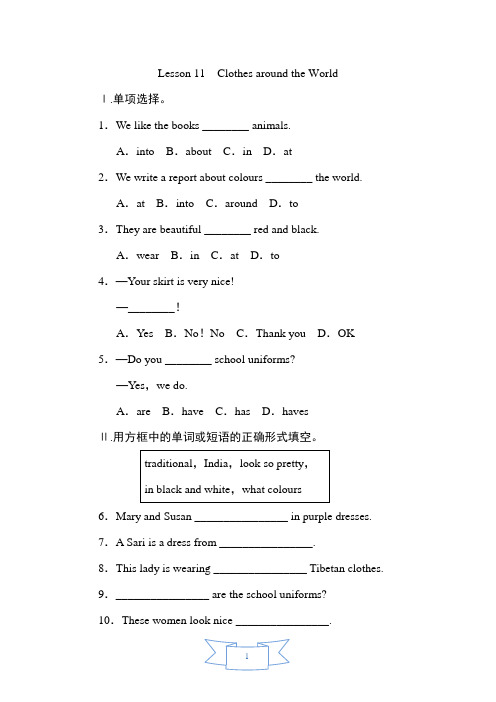
Lesson 11Clothes around the WorldⅠ.单项选择。
1.We like the books ________ animals.A.into B.about C.in D.at2.We write a report about colours ________ the world.A.at B.into C.around D.to3.They are beautiful ________ red and black.A.wear B.in C.at D.to4.—Your skirt is very nice!—________!A.Yes B.No!No C.Thank you D.OK 5.—Do you ________ school uniforms?—Yes,we do.A.are B.have C.has D.havesⅡ.用方框中的单词或短语的正确形式填空。
6.Mary and Susan ________________ in purple dresses. 7.A Sari is a dress from ________________.8.This lady is wearing ________________ Tibetan clothes. 9.________________ are the school uniforms? 10.These women look nice ________________.Ⅲ.连词成句11.India,they,from,are__________________________________________________?12.pants,blue,his,are__________________________________________________.13.looks,Sari,so,her,in,pretty,she__________________________________________________.14.your,colour,is,shirt,what__________________________________________________?15.traditional,likes,mother,clothes,my__________________________________________________.Ⅳ.完形填空。
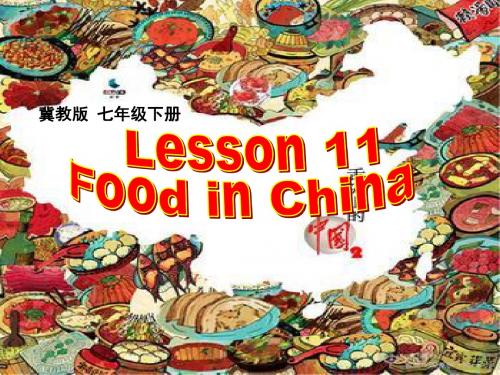
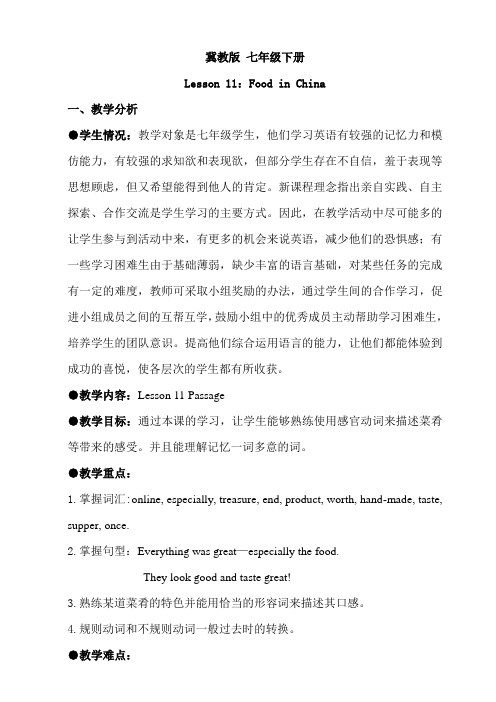
冀教版七年级下册Lesson 11:Food in China一、教学分析●学生情况:教学对象是七年级学生,他们学习英语有较强的记忆力和模仿能力,有较强的求知欲和表现欲,但部分学生存在不自信,羞于表现等思想顾虑,但又希望能得到他人的肯定。
新课程理念指出亲自实践、自主探索、合作交流是学生学习的主要方式。
因此,在教学活动中尽可能多的让学生参与到活动中来,有更多的机会来说英语,减少他们的恐惧感;有一些学习困难生由于基础薄弱,缺少丰富的语言基础,对某些任务的完成有一定的难度,教师可采取小组奖励的办法,通过学生间的合作学习,促进小组成员之间的互帮互学,鼓励小组中的优秀成员主动帮助学习困难生,培养学生的团队意识。
提高他们综合运用语言的能力,让他们都能体验到成功的喜悦,使各层次的学生都有所收获。
●教学内容:Lesson 11 Passage●教学目标:通过本课的学习,让学生能够熟练使用感官动词来描述菜肴等带来的感受。
并且能理解记忆一词多意的词。
●教学重点:1.掌握词汇:online, especially, treasure, end, product, worth, hand-made, taste, supper, once.2.掌握句型:Everything was great—especially the food.They look good and taste great!3.熟练某道菜肴的特色并能用恰当的形容词来描述其口感。
4.规则动词和不规则动词一般过去时的转换。
●教学难点:1.准确适用感官动词并区分并正确使用一词多意,。
2.能熟练的运用英语在集体讨论中抒发自己的看法。
二、教学目标:●语言知识:(1)学习和掌握本节课重点词汇。
(2)熟练掌握感官动词的用法和一词多意:taste, smell, feel, sound, look,dish, treasure, product。
(3)运用英语准确描述一些世界闻名的菜肴和口感。
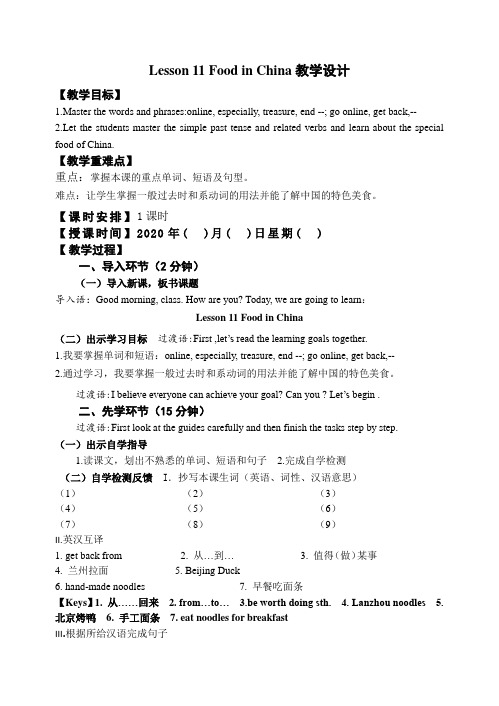
Lesson 11 Food in China教学设计【教学目标】1.Master the words and phrases:online, especially, treasure, end --; go online, get back,--2.Let the students master the simple past tense and related verbs and learn about the special food of China.【教学重难点】重点:掌握本课的重点单词、短语及句型。
难点:让学生掌握一般过去时和系动词的用法并能了解中国的特色美食。
【课时安排】1课时【授课时间】2020年( )月( )日星期( )【教学过程】一、导入环节(2分钟)(一)导入新课,板书课题导入语:Good morning, class. How are you? Today, we are going to learn:Lesson 11 Food in China(二)出示学习目标过渡语:First ,let’s read the learning goals together.1.我要掌握单词和短语:online, especially, treasure, end --; go online, get back,--2.通过学习,我要掌握一般过去时和系动词的用法并能了解中国的特色美食。
过渡语:I believe everyone can achieve your goal? Can you ? Let’s begin .二、先学环节(15分钟)过渡语:First look at the guides carefully and then finish the tasks step by step.(一)出示自学指导1.读课文,划出不熟悉的单词、短语和句子2.完成自学检测(二)自学检测反馈I.抄写本课生词(英语、词性、汉语意思)(1)____________________(2)_____________________(3)__________________ (4)____________________(5)_____________________(6)__________________ (7)____________________(8)_____________________(9)__________________ II.英汉互译1. get back from ___________2. 从…到…_____________3. 值得(做)某事_____________4. 兰州拉面____________5. Beijing Duck ____________6. hand-made noodles __________________7. 早餐吃面条_________________【Keys】1. 从……回来 2. from…to… 3.be worth doing sth. 4. Lanzhou noodles 5. 北京烤鸭 6. 手工面条7. eat noodles for breakfastIII.根据所给汉语完成句子1. 把它放在你另一只手里。

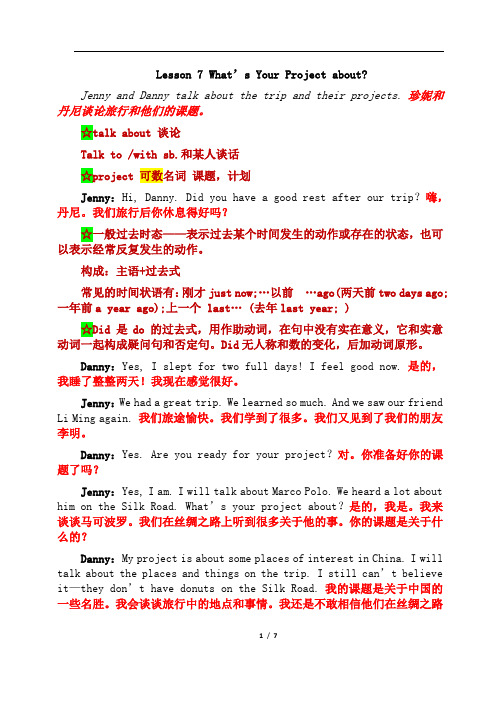
Lesson 7 What’s Your Project about?Jenny and Danny talk about the trip and their projects.珍妮和丹尼谈论旅行和他们的课题。
☆talk about 谈论Talk to /with sb.和某人谈话☆project 可数名词课题,计划Jenny:Hi, Danny. Did you have a good rest after our trip?嗨,丹尼。
我们旅行后你休息得好吗?☆一般过去时态——表示过去某个时间发生的动作或存在的状态,也可以表示经常反复发生的动作。
构成:主语+过去式常见的时间状语有:刚才just now;…以前…ago(两天前two days ago; 一年前a year ago);上一个last… (去年last year; )☆Did 是do 的过去式,用作助动词,在句中没有实在意义,它和实意动词一起构成疑问句和否定句。
Did无人称和数的变化,后加动词原形。
Danny:Yes, I slept for two full days! I feel good now.是的,我睡了整整两天!我现在感觉很好。
Jenny:We had a great trip. We learned so much. And we saw our friend Li Ming again.我们旅途愉快。
我们学到了很多。
我们又见到了我们的朋友李明。
Danny:Yes. Are you ready for your project?对。
你准备好你的课题了吗?Jenny:Yes, I am. I will talk about Marco Polo. We heard a lot about him on the Silk Road. What’s your project about?是的,我是。
我来谈谈马可波罗。
我们在丝绸之路上听到很多关于他的事。
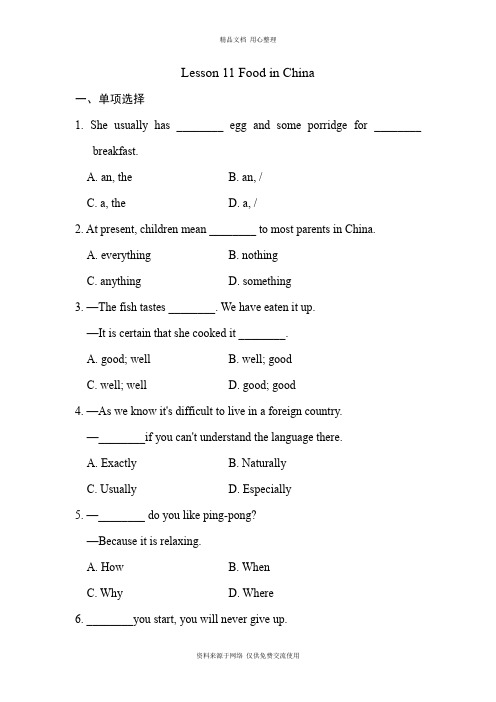
Lesson 11 Food in China一、单项选择1. She usually has ________ egg and some porridge for ________breakfast.A. an, theB. an, /C. a, theD. a, /2. At present, children mean ________ to most parents in China.A. everythingB. nothingC. anythingD. something3. —The fish tastes ________. We have eaten it up.—It is certain that she cooked it ________.A. good; wellB. well; goodC. well; wellD. good; good4. —As we know it's difficult to live in a foreign country.—________if you can't understand the language there.A. ExactlyB. NaturallyC. UsuallyD. Especially5. —________ do you like ping-pong?—Because it is relaxing.A. HowB. WhenC. WhyD. Where6. ________you start, you will never give up.A. WhatB. WhereC. OnceD. If7. It took me two weeks________ reading the novels written by GuoJingming.A. finishB. to finishC. finishesD. finishing8. ________ I go to school on foot.A. Some timesB. Some timeC. SometimeD. Sometimes9. The book is worth________. I want________ one.A. read; to buyB. reading; buyingC. reading; to buyD. read; buying10. —I think it takes a lot of practice to play the violin well.—________. Practice makes perfect (完美).A. No wayB. My pleasureC. I'm afraid notD. That's true二、用方框内所给词的适当形式填空11. —How often do you watch TV?—__________a week.12. My favourite__________are noodles and rice.13. I__________him singing in the next room when I passed.14. Some of you might ask, “Are books________interesting?”15. We had a__________trip last summer. I'll never forget it.三、连词成句16. has, long, China, history, a_______________________________________________________.17. find, will, to, answer, I, try, the_______________________________________________________.18. kind, popular, is, this, product, of_______________________________________________________.19. worth, city, the, visiting, well, is_______________________________________________________.20. noodles, breakfast, you, for, have, do_______________________________________________________?四、根据短文内容和所给提示,补全短文Different places have different foods. South Korea is a rich country in A________21. Seoul (首尔) is its capital city. It was called Hanyang a long time ________22. Tian'an is an important city in ________23(west) South Korea. You can________24(taste)many kinds of fruits, such as sweet pears and grapes there. You can also eat some delicious food, ________25(especial)cold noodles and pickles(泡菜). In China, there is a lot of________26(interest)food. For example, in Beijing, it is ________27 (truly) that you can eat Beijing Duck. It's a Chinese t________28. It________29(take)a lot of work. If you want to know more about food, you can to o________30 to fin it.答案一、1.B 2.A 3.A 4.D 5.C 6.C7.B8.D9.C10.D二、11.Once12.dishes13.heard14.really15.wonderful三、16.China has a long history17. I will try to find the answer18. This kind of product is popular19. The city is well worth visiting20. Do you have noodles for breakfast四、22.ago23.western24.taste25.especially26.interesting27.true28.treasure29.takes30.online。
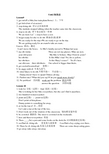
Unit2知识点Lesson91. get on/off a (bike,bus train,plane/horse) 上,下车2. get in(to)/out of a(car,taxi)3. stop doing sth. 停止正在做的事The students stopped talking when the teacher came into the classroom.4. stop to do sth. 停下来去做另一件事We are tired. Let’s stop to have a rest.5. be/get ready for sth./ to do sth 准备好(做)某事We are ready for the trip.=We are ready to go on the trip.We are getting ready for an exam/to take an exam..6.move 移动,搬迁I can’t move the boxes. Li Mei’s family moved to Wuhan last year.7. my sth =mine These are not my glasses. Mine are new.your sth=yours My bike is broken.. May I borrow yours?his sth=his Is this Mike’s hat? No, his is yellow.her sth=hers Is this Mary’s eraser? Yes.It’s hers.our sth=ours their sth=theirs Our school is bigger than theirs.8. get excited/worried/sad 变得…9. be angry with sb 生某人的气10. (don’t)have to do sth.不得不做…不必做…;Danny doesn’t have to speak Chinese all day.11. Pardon (me)? What did you say?/Can you speak more slowly?12. No problem! 没问题work out the problem 解决问题answer the question 回答问题Lesson 101. look for寻找(过程)find 找到(结果)She is looking for her bike everywhere, but she can’t find it anywhere.2. two hundred women teachers3. point at(近指) ;point to(远指)Don’t point at him,please.Danny points to something far away.4. at /on the top of 在…顶部Let’s put a star at the top of the tree.5. Don’t look out of the window of the classroom. 别向教室窗外看6. be crowded 拥挤的The street is crowded on the weekends.7. here and there=everywhere 到处8. There ____(be) a pen and some books on the desk.(be动词根据就近原则)9. see/find sb. doing sth. 看见某人做某事I see/find a boy crying over there..10. There be sb. doing sth.有某人在做某事There are some sheep eating grass.11.go away ;take away; run away1.on the farm在农场live on the twelfth floor住在第12层楼2.suddenly(adv)突然(常用语句首或句末)Suddenly, I heard someone calling“help”突然,我听到有人喊救命3. listen t o…听(过程)hear 听见(结果)hear sb. doing sth.______(听)!Can you_____(听见)someone ________(唱) in the next room?4.voice (n) 嗓音Deng Lijun has a sweet voice.5.scare(v) 惊吓---(adj)scared 害怕的You scared me. 你吓了我一跳Don’t be scared. 别害怕be scared of sb/sth 害怕…The girl is scared of dogs/doctors.be scared of doing/to do sth害怕做某事I’m scared of going out/to go out at night.6.Of course=Sure=Certainly 当然7.interesting places= places of interest 名胜古迹8.hope+将来是从句. I hope you will enjoy your trip .我希望你旅行愉快hope to do sth. I hope to see you soon.我希望很快见到你I hope so. .希望如此I hope not.希望别那样9.enjoy doing sth.=have fun doing sth. 喜欢做某事Children enjoy watching TV.10. I’m not sure. 我不确定11.a lot of=lots of 修饰可数名词复数或不可数名词Lesson 121.wait for sb./sth.to do sth.“等待某人/某物干某事”;服务员waiter(男) waitress(女) We’re waiting for the bus to come.2.finally=at last=in the end “最后,终于”3.something to eat/drink “吃的/喝的东西”4.one’s own sth.“某人自己的东西”This is my own computer5.Anything else= What else would you like? 你还要点别的吗?else后置修饰不定代词及特殊问词6.Please call me when you arrive.三个“到达”,只有arrive可单独使用,后不跟地点Lesson 131.“可能”Maybe(用于句首)=主语+may beMaybe Mr Smith is in the library.= Mr Smith may be in the library.2.quiet(adj)---(adv)quietly“安静的,安静地”Please be/keep quiet. 请安静/请保持安静They are reading newspapers quietly. 他们在静悄悄地看报。
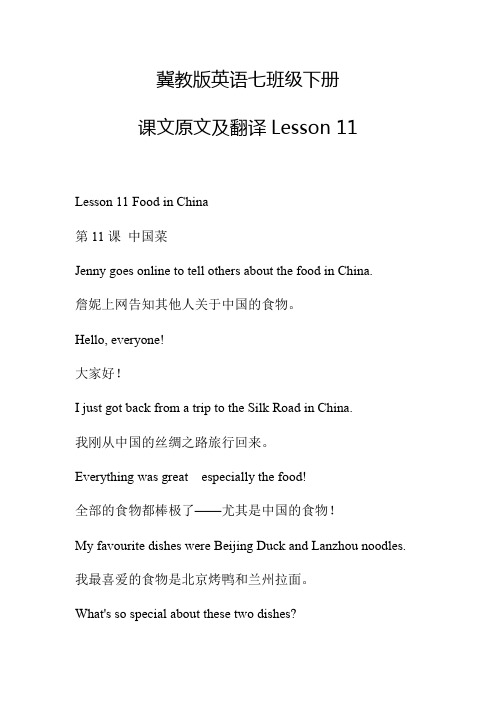
冀教版英语七班级下册课文原文及翻译Lesson 11Lesson 11 Food in China第11课中国菜Jenny goes online to tell others about the food in China.詹妮上网告知其他人关于中国的食物。
Hello, everyone!大家好!I just got back from a trip to the Silk Road in China.我刚从中国的丝绸之路旅行回来。
Everything was great especially the food!全部的食物都棒极了——尤其是中国的食物!My favourite dishes were Beijing Duck and Lanzhou noodles.我最喜爱的食物是北京烤鸭和兰州拉面。
What's so special about these two dishes?这两种食物有什么特殊的吗?Well, they have a lot of history behind them.嗯,它们背后有许多历史。
Beijing Duck is really a Chinese treasure.北京烤鸭真的是中国的珍品。
It takes a lot of work,它做起来很费事,but the end product is worth it.但是最终产品是值得的。
Lanzhou noodles are long handmade noodles.兰州拉面是手工的长面条。
They look good and taste great!他们看起来不错而且尝起来很棒!Do you want to taste these wonderful foods from China?你想尝尝来自中国的这些美味的食物吗?Your story is very interesting.你的故事真好玩I saw a show about Lanzhou noodles on TV.我在电视节目上看过一个有关兰州拉面的。
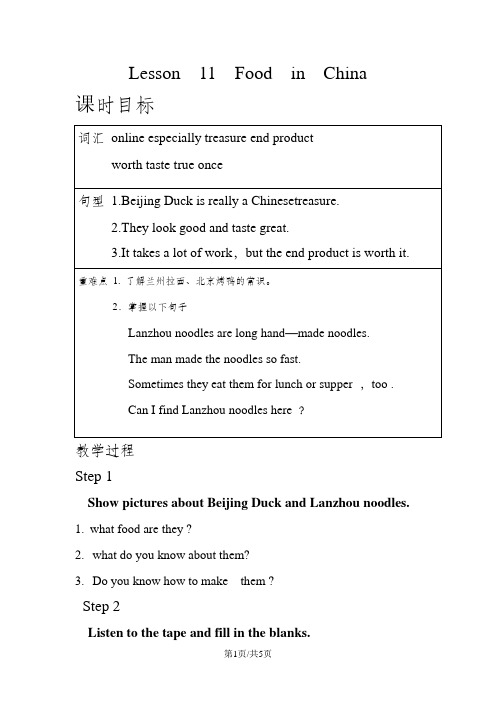
Lesson 11 Food in China课时目标教学过程Step 1Show pictures about Beijing Duck and Lanzhou noodles.1.what food are they ?2.what do you know about them?3.Do you know how to make them ?Step 2Listen to the tape and fill in the blanks.1.It …a lot of work to make Beijing Duck .nzhou noodles are ----handmade noodles.Step 3to make them ?Read the text .then decide true or false.1.Beijing Duck has some history behind it.2.People like eating Lanzhou noodles by machine.Step 4Work in groups .Read the text. Then let the students repeat and find more questions about the text.S1.How is the end product of Beijing Duck?S2.What does Jenny think of Lanzhou noodles ?S3.When do Chinese people eat noodles?Step 5 Come to Let's Do ItStep 6 Exercises.Lesson 11 Food in China一、掌握词汇1.online 形容词在线的联网的on(在……上)+ line (线,直线)go/be online 上网,在网上I am online now.2.especially 副词尤其地特别地special 形容词特别的特殊的特设的专用的special interests/food/clothes/trains/school/hospitalShe likes the county,especially in spring. 她喜欢乡村,尤其在春天。

冀教版英语七下Unit 2《Lesson 11 Food in China》教学设计一. 教材分析冀教版英语七下Unit 2《Lesson 11 Food in China》是一篇介绍中国食物的课文。
本课主要通过介绍中国的传统美食和节日饮食文化,让学生了解中国的饮食文化,并能够运用英语进行简单的交流。
教材内容丰富,插图生动,激发学生学习兴趣。
二. 学情分析七年级的学生已经掌握了基本的英语语法和词汇,对于日常生活中的饮食有一定的了解。
但部分学生可能会对一些特定的食物和节日饮食文化比较陌生。
学生的学习兴趣较高,乐于参与课堂活动。
三. 教学目标1.知识目标:学生能够掌握与食物相关的词汇和表达方式,如noodles,dumplings, hot pot等。
2.能力目标:学生能够用英语介绍自己喜欢的食物和中国传统的节日饮食文化。
3.情感目标:通过学习,学生能够增强对中华美食文化的认同感,提高学习英语的兴趣。
四. 教学重难点1.重点:学生能够熟练运用本课所学词汇和句型介绍食物和节日饮食文化。
2.难点:学生能够正确发音和理解一些特殊的食物名称和表达方式。
五. 教学方法采用任务型教学法,通过小组合作、角色扮演等互动活动,激发学生的学习兴趣,提高学生的语言运用能力。
六. 教学准备1.准备食物图片和视频素材,用于展示和介绍。
2.准备节日饮食文化相关资料,用于拓展学习。
3.设计课堂活动任务,如小组讨论、角色扮演等。
七. 教学过程1.导入(5分钟)利用食物图片和视频素材,引导学生谈论他们喜欢的食物,激发学生的学习兴趣。
2.呈现(10分钟)教师展示课文,引导学生关注课文中出现的食物词汇和句型。
通过讲解和示范,让学生掌握正确的发音和用法。
3.操练(15分钟)学生分组进行角色扮演,模拟介绍自己喜欢的食物。
教师巡回指导,纠正学生的发音和表达错误。
4.巩固(10分钟)学生自主完成课堂活动任务,如小组讨论、制作食物介绍卡片等。
教师检查学生的完成情况,并进行反馈。
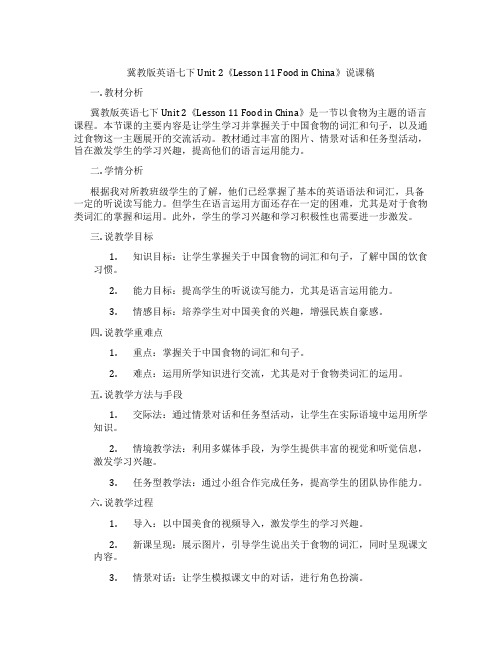
冀教版英语七下Unit 2《Lesson 11 Food in China》说课稿一. 教材分析冀教版英语七下Unit 2《Lesson 11 Food in China》是一节以食物为主题的语言课程。
本节课的主要内容是让学生学习并掌握关于中国食物的词汇和句子,以及通过食物这一主题展开的交流活动。
教材通过丰富的图片、情景对话和任务型活动,旨在激发学生的学习兴趣,提高他们的语言运用能力。
二. 学情分析根据我对所教班级学生的了解,他们已经掌握了基本的英语语法和词汇,具备一定的听说读写能力。
但学生在语言运用方面还存在一定的困难,尤其是对于食物类词汇的掌握和运用。
此外,学生的学习兴趣和学习积极性也需要进一步激发。
三. 说教学目标1.知识目标:让学生掌握关于中国食物的词汇和句子,了解中国的饮食习惯。
2.能力目标:提高学生的听说读写能力,尤其是语言运用能力。
3.情感目标:培养学生对中国美食的兴趣,增强民族自豪感。
四. 说教学重难点1.重点:掌握关于中国食物的词汇和句子。
2.难点:运用所学知识进行交流,尤其是对于食物类词汇的运用。
五. 说教学方法与手段1.交际法:通过情景对话和任务型活动,让学生在实际语境中运用所学知识。
2.情境教学法:利用多媒体手段,为学生提供丰富的视觉和听觉信息,激发学习兴趣。
3.任务型教学法:通过小组合作完成任务,提高学生的团队协作能力。
六. 说教学过程1.导入:以中国美食的视频导入,激发学生的学习兴趣。
2.新课呈现:展示图片,引导学生说出关于食物的词汇,同时呈现课文内容。
3.情景对话:让学生模拟课文中的对话,进行角色扮演。
4.任务型活动:分组完成关于中国美食的介绍任务。
5.总结与拓展:引导学生总结本节课所学内容,并拓展相关话题。
七. 说板书设计板书设计要清晰、简洁,突出本节课的主要内容和知识点。
可以采用思维导图的形式,将食物词汇和相关句子进行整合。
八. 说教学评价1.课堂表现评价:观察学生在课堂上的参与程度、听说读写能力的运用情况。

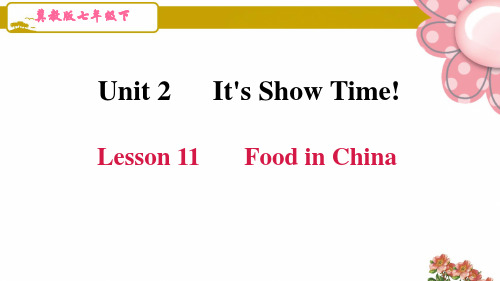

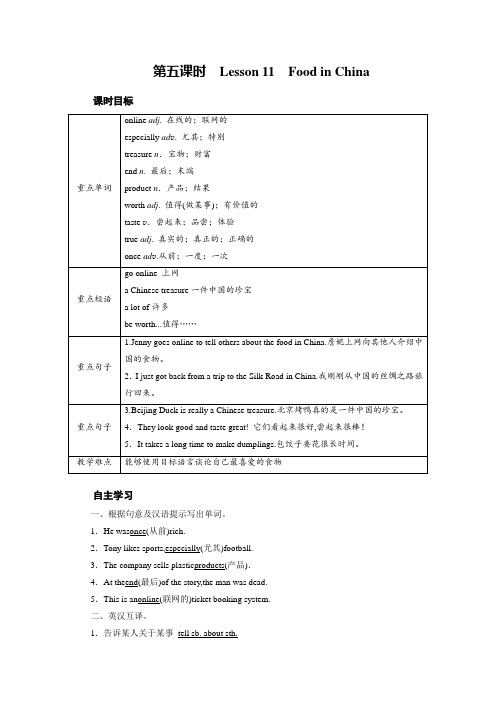
第五课时Lesson 11Food in China 课时目标自主学习一、根据句意及汉语提示写出单词。
1.He wasonce(从前)rich.2.Tony likes sports,especially(尤其)football.3.The company sells plasticproducts(产品).4.At theend(最后)of the story,the man was dead.5.This is anonline(联网的)ticket booking system.二、英汉互译。
1.告诉某人关于某事tell sb. about sth.2.一次去丝绸之路的旅行a trip to the Silk Road3.许多历史a lot of history4.一件中国的珍宝a Chinese treasure5.手工制作的面条hand-made noodles6.Beijing Duck北京烤鸭7.Lanzhou noodles兰州拉面8.go online上网9.in the library在图书馆教学过程环节1新课导入教师用PPT呈现各种各样的美食,如北京烤鸭,兰州拉面等,然后教师让学生说说,哪些是他们最喜爱的菜以及这些菜的成分及做法。
设计意图:教师带领学生谈论美食,自然地引出本课时所要学习的内容,并活跃课堂气氛;同时诱人的美食图片能够迅速吸引学生的注意力。
环节2新课学习1.教师让学生浏览一遍活动1的三个句子,理解其意思。
然后教师播放第26页的课文录音,让学生完成活动1的练习。
教师邀请三名学生分享自己的答案,最后教师订正答案。
2.教师让学生仔细阅读课文,在文中勾画出重要的单词、短语以及句子,随后教师对其进行讲解。
3.教师让学生再次阅读课文,在课文中找到活动2中的四个单词,并猜测它们的意思。
然后在活动2中勾出该单词的正确释义,教师订正答案后,让部分学生翻译方框后的短语。
4.教师让学生根据课文内容完成活动3的短文。
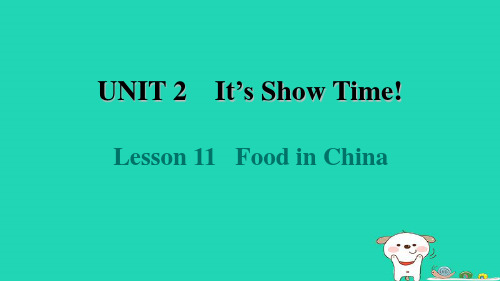
Lesson 11:Food in China基础巩固练Ⅰ. 根据句意及汉语提示完成句子1. This book is very interesting. It is ________(值得)reading.2. He passed the exam in the______(最后).3. She told me a________ (真实的)story.4. We read English books ________ (一次)or twice a week.5. The fish________ (尝起来)very delicious.Ⅱ. 选词填空6. He went to Hainan last week and got back ________(from/to)Hainan yesterday.7. Will you taste ________(so/such)special dishes?8. I ________(real/really)like singing.9. Will you taste the dishes?They taste ________(well/good).10. It took me two hours ________(finishing/to finish)the work.11. Singing is ________(interested/interesting). And it is good for us. Ⅲ. 单项选择12.—What fun The Croods is!—Yeah! I like the movie, too. It's so________.A. boringB. boredC. interestingD. interested13. This piece of music is worth ________.A. to listenB. to listen toC. listeningD. listening to14. Stay away from junk food, please. It's bad for us, ______ for children!A. recentlyB. especiallyC. probablyD. nearly15. Jane and Jim once ________ Lanzhou noodles in China.A. haveB. hasC. hadD. will have16. He ________his father. They are very tall.A. looksB. look likesC. likeD. looks like综合提升练Ⅰ. 根据句意及首字母提示完成句子1. Coffee is Brazil's main p________.2. I can go o________ with my computer in my dormitory(宿舍).3. Li Jiacheng is very rich and he owns so much t________.4. The film is very good. It is well w________ seeing.5. I like pop music, e________ the music that has great lyrics(歌词). Ⅱ. 单项选择6. These oranges look nice, but______very sour(酸的).A. feelB. tasteC. soundD. look7. The story is very ________ and all of us are ________ in it.A. interest; interestingB. interested; interestC. interesting; interestedD. interested; interesting8. Sydney Opera House(悉尼歌剧院) ________ a usual theatre and it symbolizes(象征)Australia.A. likesB. doesn't likeC. isn't likeD. looks like9. It only ________ me half an hour ________ to school every day last term.A. takes; ridingB. spent; to rideC. cost; walkD. took; to walk10. The book is well worth ________. I plan ________ one.A. read; to buyB. reading; buyingC. reading; to buyD. read; buyingⅢ. 词语运用Last year I had a trip to Beijing with my parents. We visited many places of interest there. And there is lots of delicious food in Beijing, 11. e________ Beijing Duck. So we had it for 12. s________ on the first day there. It 13. ________(taste)so delicious. I think it's really a Chinese 14. t________. We had a good time there for five days. We all think Beijing is well worth 15. ________(visit).Ⅳ. 连词成句16. every, I, online, day, go(. )________________________________________________________ 17. interesting, is, Mary's, very, story(. )________________________________________________________ 18. from, he, Liaoning, just, back, got(. )________________________________________________________ 19. Duck, a, Beijing, treasure, is, Chinese(. )________________________________________________________ 20. want, wonderful, I, to, foods, taste, these(. )________________________________________________________ Ⅴ. 阅读理解(词数:约150; 建议用时:5分钟)Mrs. Brown was very fat. Her husband(丈夫) thought she should go on a diet, and he made her not eat meat or cakes.One morning, Mrs. Brown made a nice cake for her husband, and he ate half (一半) of it. After he went out, Mrs. Brown cut a very small piece of the cake and ate it. It was very delicious. Then she cut a bigger piece and ate it, too. In a few minutes she ate up the cake. “My husband is going to be very angry, ” she thought. “What should I do?” She made another cake very quickly, ate half of it, and put the other half on the table. Mr. Brown came back later. When he saw the half of the cake on the table, he was very happy.21. Mrs. Brown's husband made her not eat meat or cakes because________.A. meat and cakes are junk foodB. meat and cakes could make her fatterC. he liked eating themD. meat and cakes could make her sick22. What's the Chinese for “go on a diet” in the passage?A. 节食B. 加强营养C. 健康饮食D. 多吃素食23. Why was Mrs. Brown's husband very happy when he saw the half ofthe cake on the table?A. Because he liked the cake.B. Because Mrs. Brown made it for him.C. Because he thought Mrs. Brown didn't eat any cakes.D. Because the cake was nice and delicious.答案基础巩固练Ⅰ. 1. worth 2. end 3. true4. once5. tastesⅡ. 6. from7. such8. really9. good10. to finish11. interesting三、12. C点拨:答语句意“是的!我也喜欢这部电影。
这部电影如此有趣。